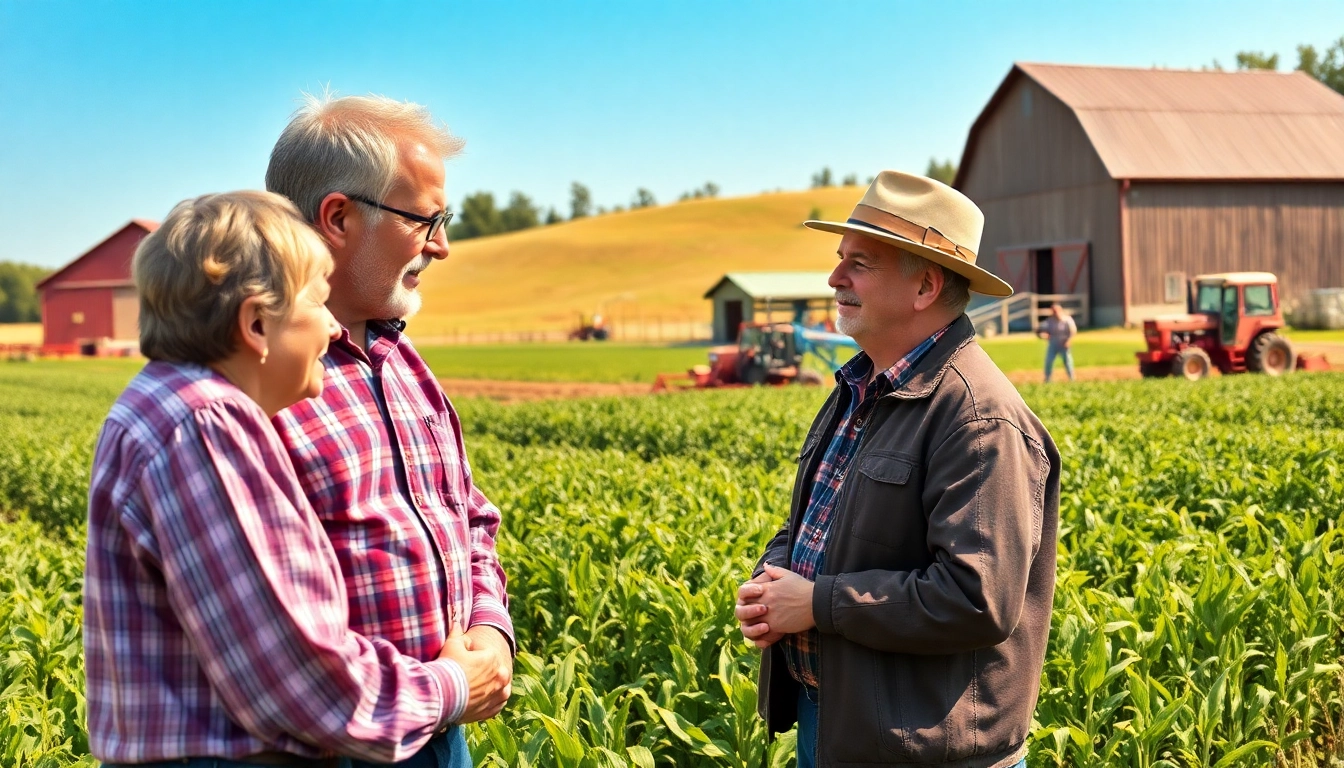What is Agricultural Law?
Definition and Scope of Agricultural Law
Agricultural law is a specialized branch of law that encompasses the various laws and regulations governing the production, marketing, and distribution of agricultural products. Its purpose is to facilitate efficient farming practices while ensuring compliance with legal standards that protect consumers, the environment, and the agricultural industry itself. This dynamic field includes a wide array of legal areas, from land use to labor relations, and is crucial in addressing the complexities of modern farming operations.
Importance of Agricultural Law in the Farming Sector
Agricultural law plays a pivotal role in the farming sector by providing a framework within which farmers can operate. This legal framework helps to mediate disputes over land use, define property rights, and regulate environmental protections. Furthermore, agricultural law affects food safety regulations, labor laws, and international trade agreements, making it an essential component for farmers looking to navigate the increasingly competitive landscape. As farming evolves with new technologies and practices, understanding agricultural law becomes paramount for success in the industry.
Key Legal Areas within Agricultural Law
In agricultural law, several key areas emerge that require farmers and agricultural professionals to stay informed about relevant regulations:
- Land Use and Zoning: Regulations governing how agricultural land can be used, including zoning laws that dictate permissible activities on specific lands.
- Environmental Law: Including laws that regulate pollution, water rights, and conservation efforts aimed at protecting natural resources.
- Food Safety and Inspection: Ensuring agricultural products meet safety standards for health and quality through various federal and state regulations.
- Labor Law: Laws governing the employment of farm workers, including wage regulations, workplace safety, and workers’ rights.
- Contracts and Trade: Addressing agreements with suppliers, distributors, and landowners, as well as trade agreements with international partners.
Understanding Regulations Affecting Agricultural Law
Federal Regulations Impacting Agriculture
Federal regulations play a significant role in shaping agricultural practices across the United States. Key agencies, such as the United States Department of Agriculture (USDA) and the Environmental Protection Agency (EPA), enforce a myriad of regulations that affect every aspect of farming. Examples include the Federal Insecticide, Fungicide, and Rodenticide Act (FIFRA), which regulates pesticide use, and the Clean Water Act, which governs water quality and discharges into navigable waters. Understanding these federal regulations is crucial for farmers to operate legally and sustainably.
State-Specific Agricultural Law Considerations
State laws can vary significantly when it comes to agricultural practices, often tailoring regulations to the specific agricultural needs and environmental conditions of each state. This can include variations in crop insurance requirements, property tax exemptions for agricultural lands, and local zoning ordinances. As such, farmers must familiarize themselves with their respective state laws to ensure compliance and to optimize their operations. Local agricultural programs often provide assistance and information regarding these state-specific regulations.
Compliance and Legal Challenges for Farmers
Compliance with agricultural laws can pose numerous challenges for farmers. Navigating complex regulations, particularly when they vary at federal, state, and local levels, can be overwhelming. Common legal challenges include understanding compliance requirements for pesticide application, adhering to animal welfare stipulations, and engaging with environmental regulations. Failure to comply with these regulations can result in severe penalties, including fines and loss of licensing. Seeking legal assistance and staying informed about regulatory updates is essential for mitigating risk.
Common Issues in Agricultural Law
Land Use and Zoning Laws
Land use and zoning laws are essential to agricultural law, as they define how land resources can be utilized. Zoning regulations can dictate whether land can be used for crop production, livestock rearing, or agritourism. Farmers may face disputes related to land use, especially in urbanized areas where agricultural lands are under threat from development. Understanding local zoning ordinances, engaging with local government, and advocating for favorable land use policies are crucial for protecting farming interests.
Environmental Regulations and Compliance
With growing concerns over environmental sustainability, agricultural producers are often subject to strict environmental regulations designed to protect natural resources. Compliance with laws related to water use, soil conservation, and waste management is vital for sustainable farming practices. Additionally, farmers may need to implement best management practices (BMPs) to reduce environmental impact and comply with regulations, which can often require significant investment in new technologies and practices. Identifying resources and support programs for environmental compliance can help mitigate these costs.
Dispute Resolution and Legal Recourse in Agriculture
Disputes in agricultural contexts can arise from a variety of issues, including contract disagreements, land use conflicts, and regulatory infractions. Understanding the mechanisms for dispute resolution, such as mediation and arbitration, can provide farmers with efficient avenues for resolving conflicts. Moreover, having access to legal recourse enables farmers to protect their rights and interests effectively. Farmers should be encouraged to maintain good documentation practices, which can serve as invaluable evidence in legal disputes.
Resources for Navigating Agricultural Law
Helpful Organizations and Associations
Numerous organizations exist to support farmers and agricultural professionals in navigating the complexities of agricultural law. These include:
- The American Agricultural Law Association (AALA), which focuses on educating legal professionals and providing resources related to agricultural law.
- The National Agricultural Law Center, which offers information and educational resources that assist farmers in understanding their legal rights and responsibilities.
- Local agricultural extension offices can also serve as vital resources, providing training and workshops on relevant laws impacting agriculture.
Online Resources and Educational Materials
Online resources are increasingly essential for educating farmers about agricultural law. Websites like the USDA and state agricultural departments provide informative documents, guidelines, and updates on agricultural policies. Furthermore, various universities offer online courses and educational materials for farmers to enhance their understanding of legal issues affecting agriculture. These resources can help farmers stay informed about changing regulations and best practices for compliance.
Legal Assistance and Consultation Options
Accessing legal assistance can be a valuable strategy for farmers to navigate complex agricultural law issues. Consulting with attorneys who specialize in agricultural law can provide farmers with tailored advice and support. Additionally, many legal aid organizations offer services to assist farmers facing economic challenges, ensuring they have access to adequate legal representation. Farmers should consider establishing a relationship with a legal expert to address potential legal issues proactively.
The Future of Agricultural Law
Trends Impacting the Agricultural Legal Landscape
The agricultural legal landscape is evolving rapidly due to changes in technology, consumer preferences, and environmental considerations. Emerging trends include increased scrutiny of food safety regulations, expansion of organic farming laws, and heightened awareness of climate change’s impact on agricultural practices. In this context, agricultural law is likely to continue adapting, requiring farmers to be vigilant and proactive in understanding how these trends impact their operations.
Innovations and Technology in Agriculture Law
Technological advancements in agriculture are not only transforming farming practices but also influencing the legal landscape. Digital technologies such as precision agriculture, drones, and data analytics are reshaping how farms operate and potentially leading to new legal considerations. Regulations concerning privacy, data ownership, and liability in the use of agricultural technology may arise. Keeping abreast of these innovations and their legal implications will be crucial for farmers looking to leverage technology responsibly and effectively.
Advocacy for Policy Changes in Agricultural Law
As the agricultural sector faces evolving challenges, advocacy for policy changes will remain a significant aspect of agricultural law. Farmers and agricultural organizations may need to engage with policymakers to influence legislation affecting agricultural practices, funding for agricultural research, and environmental regulations. Building coalitions and working collaboratively with other stakeholders within the agricultural community will be essential for advocating effectively for policies that support the sustainable future of agriculture.


